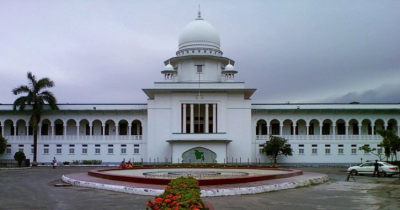
The Brahmaputra River erosion, exacerbated by sand extraction operations with dredgers stationed just 500 meters from the banks, has displaced many families. Photo: Messenger
Unplanned and unrestricted sand extraction from the banks of the Brahmaputra River in Chilmari, Kurigram has caused a dramatic alteration in the river's course, leading to severe erosion and the displacement of nearly 250 families within just two weeks.
Local residents report that the erosion, exacerbated by sand extraction operations using dredgers stationed just 500 meters from the banks, has been unprecedented. As the river's banks are being destabilized, the resulting erosion has not only claimed homes but also threatens vital infrastructure, including educational institutions and medical facilities.
One such institution, Charshakhahat Government Primary School No. 1, is in the process of being relocated due to the immediate threat of being consumed by the river. Additionally, a clinic and a government housing center in the union are also under threat, raising concerns about the safety and stability of these essential services.
Residents like Kashem, Saidul Islam, and Jaher Ali from Charshakhati and Karaibarishal areas have voiced their frustrations and fears. They attribute the heightened erosion directly to the sand extraction activities, stating that although the Brahmaputra naturally erodes its banks, the unregulated extraction has accelerated the process to an abnormal and devastating extent.
The crisis has sparked a demand among the affected communities for the cessation of sand extraction. "The river did not erode for a while when sand extraction was halted in 2019," said Kashem, one of the residents. "But when the extraction resumed last year and this year, the erosion returned with a vengeance, affecting areas like Charshakhati and Karaibarishal."
An on-site visit to Bajradia in Nayahat Union revealed that 27 families in the area have been victims of river erosion. The entire Char is at risk, with flood victims reporting a lack of relief assistance. The residents' plight is compounded by the threat to the right bank protection embankment in Kanchkol area of Raniganj Union, where authorities have attempted to mitigate the risk by filling and dumping geo bags with sand.
In response to the escalating crisis, Upazila Nirbahi Officer (UNO) Md. Minhazul Islam has announced that legal actions will be taken against those involved in the illegal extraction of sand from the river or its banks. "The administration will continue to work to stop illegal sand extraction," he assured, emphasizing the commitment to protect the riverbanks and the communities that depend on them.
Attempts to reach Md. Rakibul Hasan, Executive Engineer of the Kurigram Water Development Board, for a comment on the situation were unsuccessful as he did not respond to calls.
The situation in Chilmari highlights the urgent need for sustainable river management practices that balance economic activities with environmental protection. The plight of the 250 homeless families and the threat to another 200 underscore the severe human impact of ecological mismanagement.
While the administration's pledge to enforce legal measures against illegal sand extraction offers some hope, the affected communities are calling for immediate and effective action to prevent further displacement and destruction. The situation calls for a coordinated response involving local authorities, environmental experts, and community members to develop and implement sustainable solutions that address both the immediate crisis and the long-term health of the Brahmaputra River ecosystem.
Messenger/Fameema








